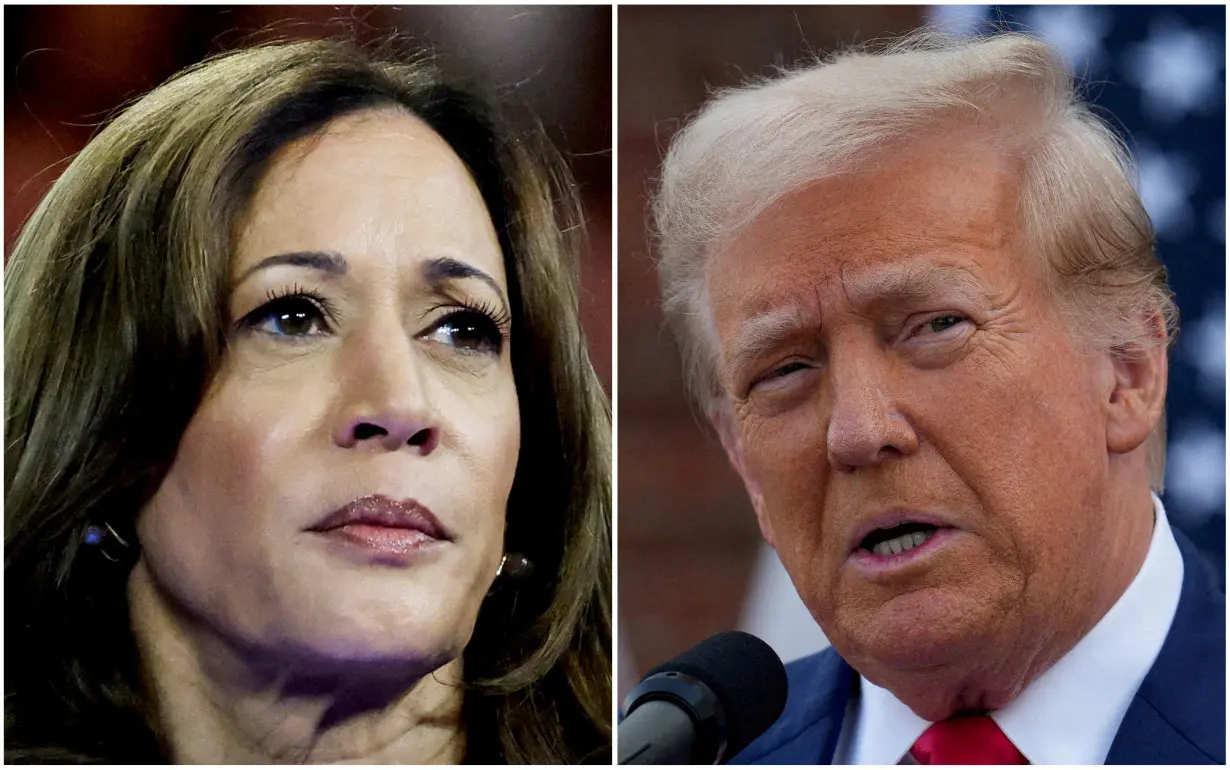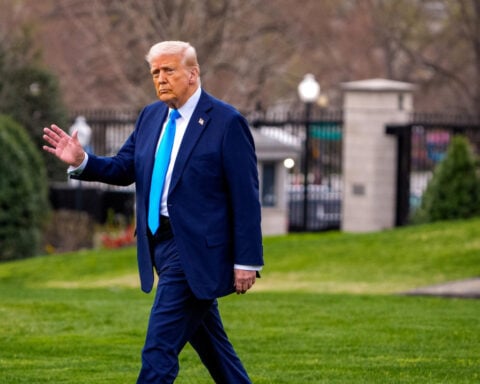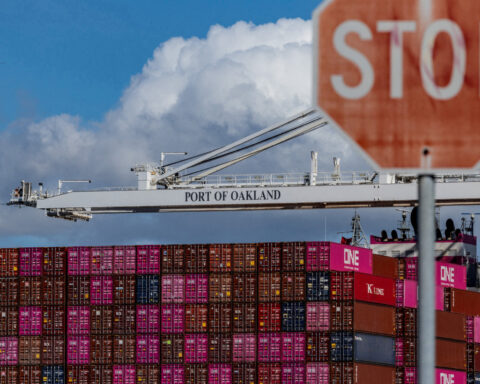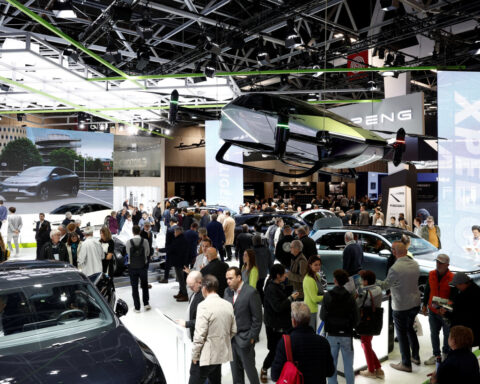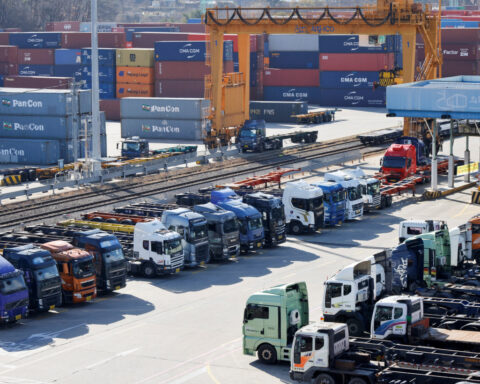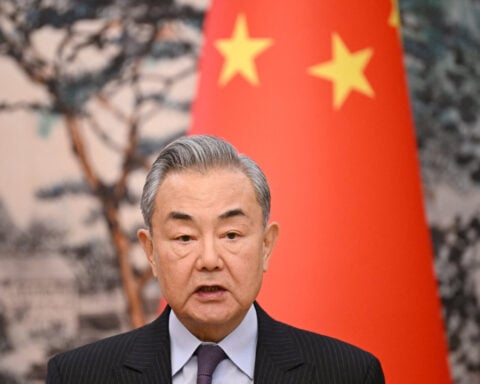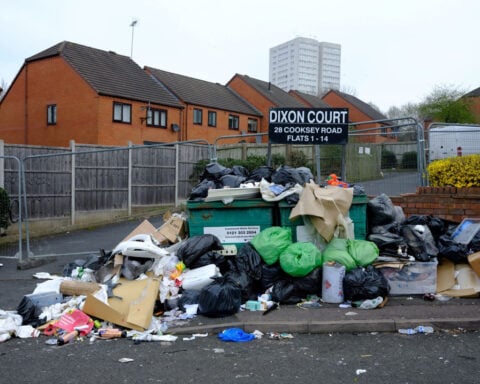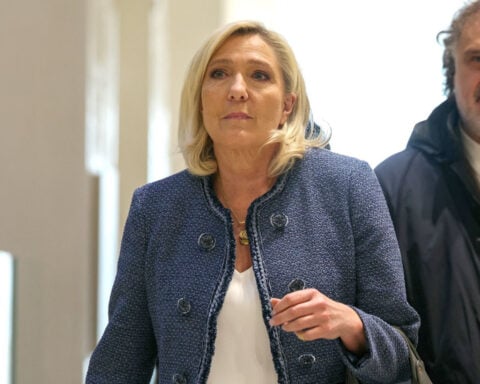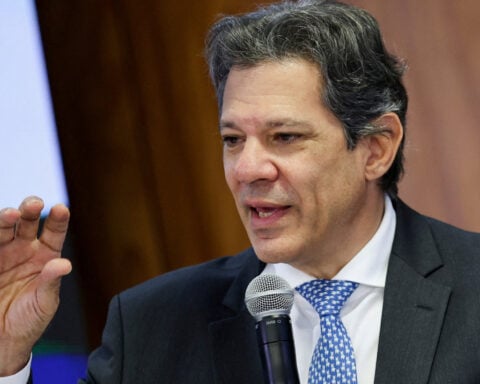By Mark John and Philip Blenkinsop
(Reuters) - For Europe's economy, the Nov. 5 U.S. election offers a "least bad" outcome of a challenging Kamala Harris presidency or a second encounter with Donald Trump which threatens to be yet more bruising than the first.
On two key areas - trade policy and the sharing of rising security costs among NATO allies - Europe expects few favours from a Harris presidency which it sees as "Biden continuity".
Trump 2.0, on the other hand, presents multiple dangers: if he were to pull U.S. support for Ukraine, European governments would need to ramp up defence spending fast; and if he triggered a global trade war, Europe fears it would be the big loser.
Anti-China measures are a rare area of bipartisan agreement in the U.S. election campaign. For Europe's export-driven economy, that raises the question as to whether it can continue to juggle trade ties with both the United States and China.
"Whoever the winner of the U.S. election is, it is unclear whether Europe can continue to benefit from U.S. growth without reducing trade with China itself," said Zach Meyers of the Centre for European Reform (CER) think tank.
"Both U.S. candidates have the same direction of travel - Trump less predictable and perhaps willing to be more confrontational with the European Union."
For ASML, a Dutch supplier of hi-tech microchip manufacturing equipment, the risk of collateral damage from U.S. efforts to "contain" China is all too real - it already faces export bans on half its products to China after a U.S.-led campaign.
"There's a strong will in the U.S. to seek more restrictions - I think it's very clear and it's something that's bipartisan," ASML CEO Christophe Fouquet told a conference last month. "And so I think whatever happens in November, this will stay."
Half of Europe's output comes from trade, double the rate in the United States, while the region's 30 million manufacturing jobs - compared to only 13 million in the United States - mean it is highly vulnerable to anything that restricts commerce.
MORE TARIFFS?
Support for free trade in Washington has evaporated in the past decade. Joe Biden chose not to scrap outright tariffs levied in Trump's first presidency and has added his own focus on U.S. jobs with the Inflation Reduction Act (IRA) subsidies.
While Harris is seen pursuing a path similar to Biden, Trump has threatened to go further with across-the-board tariffs of 10-20% on all imports - including those of Europe, with whom America still has annual trade worth over one trillion euros.
Spanish olive producers have seen their exports to United States, once their main foreign market, slump by 70% after Trump in 2018 imposed tariffs which remain in place despite World Trade Organization (WTO) rulings against them.
"If Trump wins, this could get worse and we think it will be difficult to resolve this without pressure from Europe," Antonio de Mora, head of ASEMESA, the body which represents Spain's olive exporters, told Reuters.
For those European companies with U.S. presences, the added uncertainty is whether Trump will follow through on promises to scrap Biden's IRA green energy subsidies.
German machinery firm Trumpf, which employs 2,000 U.S. staff and supplies equipment for electric vehicle batteries and solar, told Reuters it was not expanding those activities in the United States due to uncertainty about the election outcome.
GROWTH DAMPENER
The U.S. election could also have major implications for the defence budgets of European governments struggling with debt levels inflated by post-pandemic recovery spending.
Again, the question is more one of timing than destination: Harris is expected to pursue U.S. pressure on Europe to pick up more of the tab for regional security while the lack of clarity around Trump's commitment to Ukraine hugely ups the ante.
"In our view, a Trump presidency increases the risk that spending needs to be ramped up sooner, while a Harris presidency may give Europe more time," UBS analysts said in a note.
Thus, while a Harris presidency could have little measurable impact on Europe's economy, the downside risks of a second Trump term in office are clearly tangible.
Goldman Sachs economists estimate that if Trump went ahead with his tariffs, their direct effect plus the trade uncertainty they would generate could shave one percentage point off output in the 20 countries of the euro area - more than the weak 0.8% growth they are forecast to eke out this year.
Any economic growth benefits to be had if an ebbing U.S. commitment to Ukraine forced Europe to boost defence spending would be cancelled out by the hit the regional economy would take from the resulting geopolitical risk, they noted.
The European Commission has a closed-door team of officials to study how the EU will be affected by the election outcome. But any policy conclusions they draw will need to secure an EU consensus - which, as shown by the bloc's divisions over how to deal with Chinese electric vehicle imports, can be elusive.
Pro-European optimists suggest the US election - especially in the event of a Trump victory - could have a salutary shock effect of finally spurring the region to adopt the type of deep reforms proposed by former ECB chief Mario Draghi last month.
"The prospect of more tense transatlantic relations should encourage the EU to address the reasons why its economic size has been shrinking relative to the US economy," noted CER.
(Additional reporting by Toby Sterling in Amsterdam; Christopher Steitz in Berlin; Corina Pons in Madrid; Editing by Ed Osmond)

 Trump has begun another trade war. Here's a timeline of how we got here
Trump has begun another trade war. Here's a timeline of how we got here
 Canada's leader laments lost friendship with US in town that sheltered stranded Americans after 9/11
Canada's leader laments lost friendship with US in town that sheltered stranded Americans after 9/11
 Chinese EV giant BYD's fourth-quarter profit leaps 73%
Chinese EV giant BYD's fourth-quarter profit leaps 73%
 You're an American in another land? Prepare to talk about the why and how of Trump 2.0
You're an American in another land? Prepare to talk about the why and how of Trump 2.0
 Chalk talk: Star power, top teams and No. 5 seeds headline the women's March Madness Sweet 16
Chalk talk: Star power, top teams and No. 5 seeds headline the women's March Madness Sweet 16
 Purdue returns to Sweet 16 with 76-62 win over McNeese in March Madness
Purdue returns to Sweet 16 with 76-62 win over McNeese in March Madness
